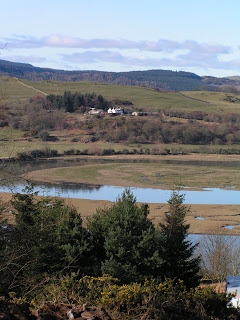Globalisation seems to be an attempt to override the traditional wisdom that the most important determinants of property value are location, location, and location. With profligate use of fossil fuels, goods and people can be moved anywhere. Living a long time in one place is a privilege granted to far too few of us these days. When one's work is also largely 'at home,' the deeper relationship to place is intensified. That this is nowadays such an uncommon boon is a mark of our times - mobility seems more highly prized than stability. I am 34 years in place.
 Click image for full size view
Click image for full size viewThe front door overlooks a tidal valley with a settlement of six thousand folk a few miles upriver and a disused ford and fishing port (now yachts & dinghies) a mile downstream (both thankfully on the other side of the river!) Half a mile downhill (but upriver) is Palnackie, which owes its existence to good anchorage and functioned as the principal port for the catchment. From the hills out back, the landscape is coastal peninsula and bay grading through arable, pasturage, and forested hills which rise steeply above treeline to 1250 feet.
It would be difficult not to become deeply attached to such a place. Sadly, many of our young are unable to remain. The dominant economic assumptions and the imperative of mobility draw them off and we maintain our low but stable population largely by importing silvertips who can afford to live here without paid work.
The Stewartry of Kirkcudbright is over one-third forest (if the term is used loosely enough to include conifer plantations) and over the years, I have developed a deep interest in the trees which are the nearest and most numerous of my neighbours above the scale of birds and mice. For so long-lived a clan, however, the tree folk have few really old members hereabouts. Yet, timber harvesting is expected to double in the next fifteen years, the optimum lifespan of a Sitka Spruce being reckoned at forty five years.
There is considerable discussion and debate on the strategies appropriate for forested land, whether more land should be forested, and appropriate objectives for such afforestation. From the trees which currently cover one sixth of Scotland, only one Scot in five hundred is employed. Best estimates are that fewer than one in fifty jobs locally is provided by the trees who occupy one third of the land. There would seem a strong argument that any public money in the sector should be targeted towards developing forests with more direct benefits to people, particularly those who live (or wish to live) in close proximity to forests.
"Thus, at the heart of the Strategy there must be a strategic direction: - to ensure that forestry in Scotland makes a positive contribution to the environment. ...This must recognise the need to ensure that Scotland's trees, woods and forests are located and managed for long term sustainability and biodiversity in order to make the maximum contribution to the environment consistent with agreed economic objectives." (1)
But it is apparent that the Forestry Commission, who manage the public estate, and their private sector colleagues are constrained by such "agreed economic objectives" which require maximum mechanisation and upgrading public roads to carry the heaviest lorries and machinery. "If vehicles are overloaded this process [road damage and deterioration] is accelerated. Studies over many years have shown that the damage caused is proportional to the fourth power of the weight. [emphasis added]" (2) Thus, putting twenty tonne load limits on rural roads would remove almost 94% of the damage . It would also involve twice as many jobs for lorry drivers and increase the cost of timber haulage, as opposed to externalising the social and economic cost of roads onto local authorities (communities). This is utterly rejected by the industry as harmful to competitiveness.
"Rather than presenting quick answers, as technocratic culture tends to do, we need to reflect on whether or not we are asking the right questions...[or whether] ...people ‘participate’ in a project without having to decide on the critical issues related to that project."
-- Pablo Leal (3)
It would seem that everything is up for discussion in consultation with the notable exception of "agreed economic objectives" which are obviously agreed elsewhere. That the perceived need to become competitive in the global market militates the minimisation of employment and maximisation of fossil-powered mechanisation with attendant emissions only emphasises the folly of continuing to build a global culture based on moving things and people around by burning carbon. Such thinking is not restricted to forestry or agriculture, but is visible everywhere in our heavy addiction to mobility. Transport is the sole sector expected to increase emissions of greenhouse gasses in the coming decade(s). This seems so accepted that it passes without notice in government papers. (4,5)
In short, in consultations concerned with rural development, land reform, land-use, including forestry, and probably many another, a common thread emerges, embodying the persistent fallacy that the economy contains the ecology. Sustainable development, the mantra repeatedly invoked, must in every case be subservient to "agreed economic objectives." Clearly the right questions are not yet being asked of the right folk.



 The Gods smiled upon our Carol singing gathering, providing
The Gods smiled upon our Carol singing gathering, providing  And a smokeless fire of ashwood. Much song and conversation and very little digital camera use....
And a smokeless fire of ashwood. Much song and conversation and very little digital camera use....
 Season's Greetings!
Season's Greetings!
